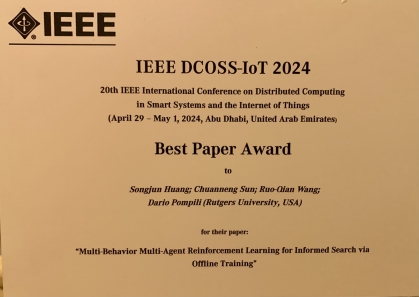SoE Researchers Win Best Paper Award

SoE Researchers win Best Paper Award at the 20th IEEE Annual International Conference on Distributed Computing in Smart Systems and the Internet of Things (DCOSS-IoT 2024)
ECE Professor Dario Pompili, ECE graduate students Songjun Huang and Chuanneng Sun, and CEE Assistant Professor Ruo-Qian (Roger) Wang have won the Best Paper Award at the 20th IEEE Annual International Conference on Distributed Computing in Smart Systems and the Internet of Things (DCOSS-IoT 2024), which was held in April 29 - May 1, 2024, in Abu Dhabi (UAE), for their paper titled “Multi-Behavior Multi-Agent Reinforcement Learning for Informed Search via Offline Training”.
The conference intended since its creation to cover several aspects of distributed computing in smart systems such as high level abstractions and models, systematic design methodologies, signal and information processing, algorithms, analysis and applications. Starting from the 2023 event, DCOSS is broadening its scope beyond sensor networks to smart systems in general as well as the Internet of Things (IoT). The updated name is “Distributed Computing in Smart Systems and the Internet of Things” (DCOSS-IoT).
The winners were presented with an award certificate and a plaque. The abstract of the award winning paper is below.
Abstract: In modern informed search missions, Multi-Robot Systems (MRSs) are playing more and more important roles due to their flexibility in exploring environments. Reinforcement learning (RL) is now widely used as a decision-making method for MRS. However, existing RL-based and conventional model-based frameworks cannot deal with some challenges posed by the real-world environment. To address these challenges, a Multi-Behavior Multi-Agent Reinforcement Learning (MBMARL) framework via offline reinforcement learning method was developed. In this framework, each agent is deployed with multiple behavior policies to let the agent have choices on behaviors given a state. The proposed framework is compared with traditional reinforcement learning frameworks, including Multi-Agent Actor Critic (MAAC) and REINFORCE. The result shows that MBMARL outperforms others in both aspects of total reward and convergence time.

